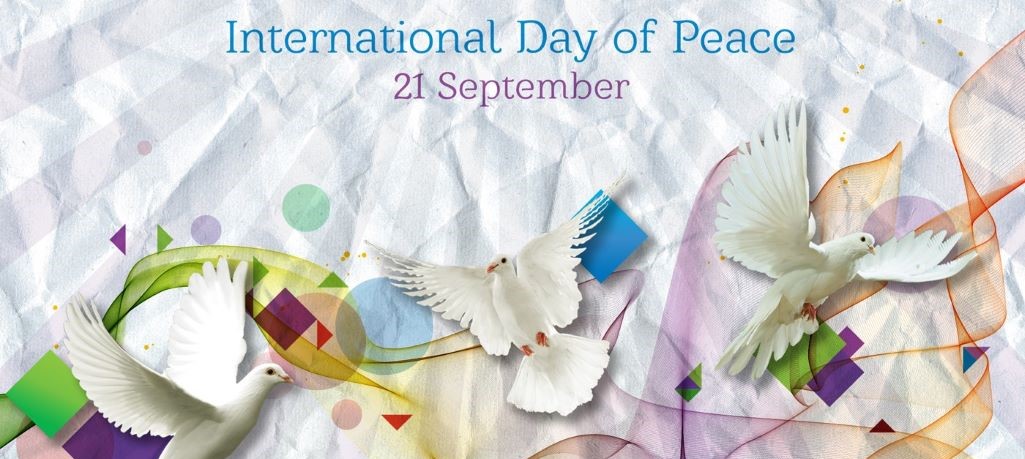Washington, DC., 21 September 2025—
The International Day of Peace, observed annually on 21 September, is a global initiative to promote peace and security, end conflicts, and build a more harmonious world. Celebrated across nations, this day stands as a reminder of the importance of unity, understanding, and tolerance in fostering peaceful communities.
When most people think of peace, the first image that likely comes to mind is the end of a war; a ceasefire, a truce, or an agreement between conflicting nations. While the absence of war, conflict, and violence is important, it represents only a fraction of the true meaning of peace. In the broader sense, peace involves the creation of conditions that allow individuals and societies to thrive; conditions where people can live without fear, enjoy equality, and pursue personal and collective fulfillment. It encompasses social, emotional, and economic well-being, justice, and respect for human rights.
In a world that is often fractured by political, religious, and social divisions, the International Day of Peace serves as a poignant reminder of what is at stake. Every year, millions of people are affected by war, violence, and injustice. Conflicts disrupt lives, destroy infrastructure, and create cycles of poverty and instability. We need to look no further than Gaza, Ukraine, Myanmar, and Sudan to see how the ravages of war impact societies. The importance of peace, therefore, goes beyond simply stopping violence. It is about creating systems that encourage dialogue, reconciliation, and fairness. Peace contributes to the well-being of individuals and communities, providing a foundation for prosperity, growth, and human rights.
Peace and Justice
Peace cannot be sustained without justice. Societies built on injustice, discrimination, and corruption cannot achieve long-lasting peace. When people are denied their basic human rights, are oppressed, or subjected to systemic inequality, conflicts are more likely to arise. The pursuit of social justice ensures that peace has a solid foundation, where all people are treated fairly and equitably.
For example, the end of apartheid in South Africa didn’t just bring about the absence of armed conflict; it brought about a systemic effort to build a society rooted in racial equality, human rights, and social integration. Nelson Mandela’s vision for a post-apartheid South Africa was one where social justice and reconciliation were as important as political stability.
Economic Stability
Economic conditions play a crucial role in achieving peace. Poverty, economic inequality, and lack of opportunity can drive people into conflict, creating cycles of unrest and violence. On the other hand, economic prosperity, fair distribution of resources, and access to basic needs like healthcare and education create an environment where peace is more likely to flourish.
Economic stability is also crucial in post-conflict situations. Countries that emerge from war need not only a peace treaty, but also the reconstruction of their economies to prevent a return to violence. The Marshall Plan, for instance, helped rebuild war-torn Europe after World War II, providing both financial aid and a vision for economic stability that contributed significantly to long-lasting peace in the region.
Peace as Well-Being
In a world marked by constant stress, anxiety, and division, another dimension of peace often overlooked is emotional and psychological peace. Communities that emphasize mental and emotional well-being and support structures like mental health care create environments where people are less likely to resort to violence or aggression as a response to stress or hardship. Emotional peace can also lead to more harmonious relationships, whether between individuals, families, or communities.
A Culture of Peace
To achieve peace, it is essential to foster a culture of peace from the ground up. The world still faces numerous challenges in achieving lasting peace. Conflicts are ongoing in regions such as the Middle East, sub-Saharan Africa, and parts of Asia. The global rise in political tensions, economic inequality, and climate change also poses significant threats to peace and stability.
Cultivating a culture of peace includes educating young people about the value of conflict resolution, empathy, compassion, and cooperation. Promoting civic engagement, community dialogue, and cross-cultural understanding helps build social cohesion. Peace requires a commitment to the protection of human rights and the dignity of all people, including standing up against any form of oppression, from racial discrimination to gender inequality.
Additionally, the spread of misinformation and hate speech online often exacerbates divisions, creating environments ripe for conflict. Thus, while the International Day of Peace is a step in the right direction, the world must keep striving toward greater tolerance, dialogue, and understanding.
Peace Is a Way of Life
The International Day of Peace is not simply a day for reflection, but a global call to action. Peace is not just the absence of war; it is a way of life, a complex web of social, economic, emotional, and political factors that come together to create a sustainable and harmonious world. Each individual plays a role in fostering peace within their communities and personal lives. Practicing empathy, challenging stereotypes, and promoting understanding in daily interactions are all crucial steps toward creating a peaceful world. These are steps that, when we are taking them in unison, prove that we are Better Together.
Photo Credit: International Day of Peace by FTTUB. Licensed under CC BY 2.0

